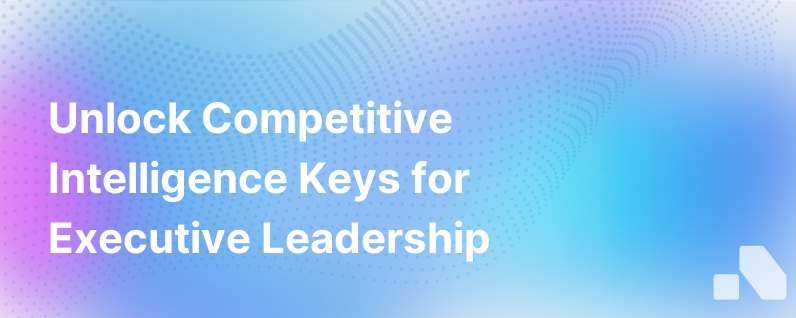
For those of us in leadership roles, competitive intelligence often feels like an abstract, out-of-reach concept. Intelligence is gathered, reports created, yet somehow the "why" and "how" it impacts the bottom line remain elusive. We understand its strategic importance, but enhancing its tangible value for leadership calls for more than just data collection.
Competitive intelligence delivers value when it’s actionable and directly influences decision-making. Below, we’ll explore the importance of competitive intelligence for leadership and how it can be utilized to drive strategic outcomes.
What is competitive intelligence?
Competitive intelligence is the systematic collection and analysis of information about competitors, markets, customers, technologies, and any other factors that may influence business strategies. It involves studying everything from economic trends to activity within a specific industry. The goal is to offer insights to leadership that enable data-driven decisions.
How does it benefit leadership?
Competitive intelligence presents distinct advantages and meaningful perspectives for leadership. Here are a few key benefits:
Strategic Planning: It provides critical inputs in strategic decisions like market entry, product development, acquisitions, or expansions. For instance, it can improve your understanding of your competitors’ plans and activities, helping shape counterstrategies.
Risk Assessment: Competitive intelligence helps leadership identify and anticipate threats in the marketplace. Whether it's a competitor's product launch or a regulatory change, these insights allow you to mitigate potential hazards proactively.
Identifying Opportunities: By thoroughly understanding what's happening in your market, leadership can identify unmet customer needs, untapped markets, or shifting trends before competitors do, opening doors to new opportunities.
How to effectively communicate competitive intelligence to leadership
Leadership sees an ocean of data daily – to get their attention, competitive intelligence needs to be brought to the surface in a focused, digestible, and actionable manner.
Summarize Key Insights: Start your presentations off with the most noteworthy takeaways. Leaders are time-poor, so get to the point quickly.
Tell a Story: Rather than rattling off statistics, weave a narrative. Tell a story that builds from the data to strategic implications and recommended actions.
Visualize Data: Charts, graphs, and visual representations make Data easy to digest. A good graph or diagram can illustrate a point much more effectively than a paragraph of text.
The role of AI in competitive intelligence
Both qualitative and quantitative data need to be analyzed to make sense of competitive intelligence. This requires substantial effort and is time-consuming. However, AI tools like Aomni can automate data collection, organize vast amounts of data, and present real-time insights – freeing up time for interpretation and action.
Through advanced AI, you can extract intelligence from tens of thousands of data sources encompassing news articles, social feeds, blogs, and more. Aomni offers you efficiency, speed, and the ability to drill down into data, surfacing actionable insights for leadership.
Case Example: Leadership decision improved with Competitive Intelligence
To help illustrate the advantage of competitive intelligence, consider the example of a hypothetical B2B SaaS company: ZYTech.
ZYTech’s competitor, AlphaSoft, was rumored to be developing an update to their popular software that would significantly outperform ZYTech's current offering. Instead of speculation and worry, ZYTech's leadership employed competitive intelligence gathering.
Through careful analysis of AlphaSoft's marketing communications, patent filings, job postings, and other public info, ZYTech figured out that although AlphaSoft's update was impressive, it was still at least 18 months from launch.
This insight gave ZYTech's leadership time to realign resources and fast-track their product development efforts. Thus, they launched an updated version of their own software six months before AlphaSoft, maintaining their market position and customer base.
Conclusion
In an increasingly competitive and rapidly changing business landscape, competitive intelligence provides leadership with a clear lens to view the marketplace. When leveraged effectively, it can be a difference-maker in strategic planning, risk management and capitalizing on opportunities.
By gathering, analyzing, and effectively communicating valuable insights, competitive intelligence can empower your leadership to make more informed strategic decisions that directly enhance your organization's growth, stability, and future success. The addition of AI platforms, like Aomni, propels the straightforward gather-and-present model of the past into a new era of real-time, actionable insights, empowering leadership with the critical intelligence they need for success.